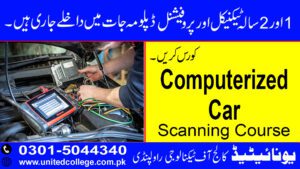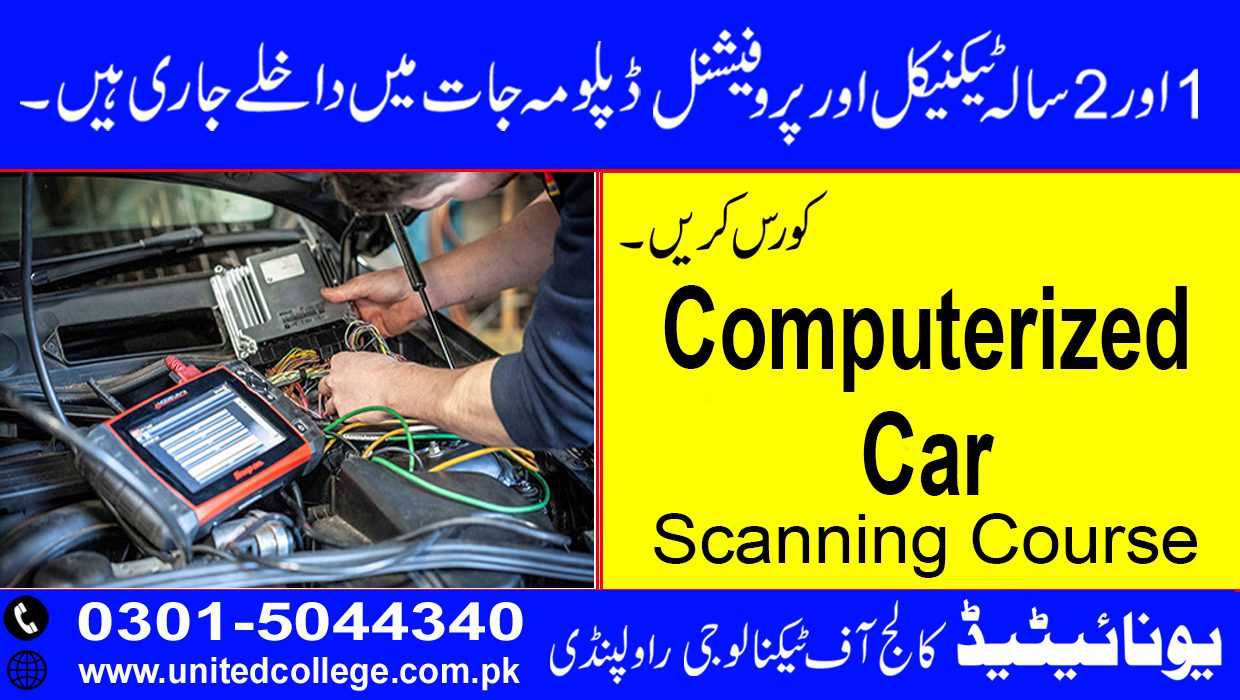Computerized Car Scanning Course in Rawalpindi Islamabad 0301-5044340
Introduction
A Computerized Car Scanning Course in Rawalpindi and Islamabad is a comprehensive and highly specialized training program that equips individuals with the knowledge and skills required to diagnose and troubleshoot modern vehicles using advanced scanning tools. As automobiles have become increasingly sophisticated, car scanning has become an integral part of vehicle maintenance and repair. This course is essential for aspiring automotive technicians, mechanics, and enthusiasts who wish to stay current with the latest automotive technology and deliver high-quality service to their customers.
In the introductory phase of the course, students typically gain an understanding of the fundamental concepts behind car scanning. They learn about the importance of electronic control units (ECUs) in modern vehicles and how these ECUs manage various vehicle functions, from engine performance to safety systems. Students also explore the evolution of automotive diagnostics, highlighting the shift from traditional mechanical diagnosis to electronic and computer-based methods.
The course content goes on to delve into the intricacies of car scanning tools and equipment. Participants learn about the various types of diagnostic tools available, including OBD-II scanners, scan tools, and software applications used for vehicle diagnostics. They become proficient in connecting these tools to a vehicle’s OBD-II port and interpreting the data generated by the scanner.
One of the core aspects of the course is hands-on training in using car scanning tools for real-world diagnosis. Students practice reading diagnostic trouble codes (DTCs), analyzing live data streams, and conducting functional tests to identify and address issues with the vehicle’s engine, transmission, ABS, airbags, and other critical systems.
As the course progresses, students explore advanced diagnostic techniques, such as scope analysis and the use of oscilloscopes, which provide a deeper insight into a vehicle’s electrical and electronic systems. They also learn how to interpret manufacturer-specific diagnostic information and utilize service manuals and technical resources effectively.
Furthermore, the course emphasizes the importance of safety and ethics in automotive diagnostics. Students are trained to ensure that they adhere to industry best practices, maintain data privacy, and use their scanning capabilities responsibly.
In conclusion, a Car Scanning Course in Rawalpindi and Islamabad is an invaluable educational opportunity for individuals seeking a career in automotive diagnostics.
Course Content:
The course content for a Car Scanning Course in Rawalpindi and Islamabad typically covers a wide range of topics related to automotive diagnostics and the use of computerized scanning tools. Here’s a sample course outline that includes the key areas of study:
Module 1: Introduction to Automotive Diagnostics
- Understanding the importance of vehicle diagnostics
- Historical perspective and evolution of automotive diagnostics
- Role of electronic control units (ECUs) in modern vehicles
- Overview of diagnostic systems and tools
Module 2: On-Board Diagnostics (OBD) Systems
- Introduction to OBD and OBD-II standards
- Functionality of OBD-II systems
- Accessing the OBD-II port and connecting diagnostic tools
- Reading and interpreting diagnostic trouble codes (DTCs)
Module 3: Diagnostic Tools and Equipment
- Types of diagnostic tools: scan tools, code readers, and software applications
- Features and capabilities of common diagnostic tools
- Selecting the appropriate tool for specific tasks
Module 4: Live Data and Data Analysis
- Capturing and analyzing live data streams
- Identifying sensor and actuator values
- Interpreting data to diagnose performance issues
- Real-time troubleshooting using diagnostic tools
Module 5: Functional Tests and Component Testing
- Conducting functional tests for various vehicle systems
- Evaluating sensor and actuator operation
- Hands-on practice with component testing
Module 6: Advanced Diagnostic Techniques
- Scope analysis and oscilloscope usage
- Understanding waveform patterns
- Using advanced tools to diagnose electrical and electronic systems
Module 7: Manufacturer-Specific Diagnostics
- Accessing manufacturer-specific diagnostic information
- Navigating service manuals and technical resources
- In-depth analysis of diagnostic data for specific vehicle makes and models
Module 8: Troubleshooting and Problem-Solving
- Strategies for systematic troubleshooting
- Identifying and addressing complex issues
- Case studies and real-world problem-solving scenarios
Module 9: Safety and Ethics in Automotive Diagnostics
- Ensuring safety when working on vehicles
- Data privacy and security considerations
- Ethical conduct and professionalism in the field
Module 10: Practical Hands-On Workshops
- Hands-on practice using diagnostic tools
- Real-world diagnosis of vehicle issues
- Simulation of diagnostic scenarios
Module 11: Final Assessment and Certification
- Written and practical examinations
- Evaluation of diagnostic skills
- Awarding of a certification upon successful completion
Car Scanning Course in Rawalpindi Islamabad 0301-5044340
Course Duration: 1 YEAR
Total Fee: 35000/-
Contents


